- Home
- Gayle Forman
Leave Me Page 2
Leave Me Read online
Page 2
“I think they, like, ordered another blood draw,” the doctor said.
“Another one. Why? I thought my EKG was normal.”
“It’s procedure.”
More like covering their asses or padding the bill. Maribeth had once edited an exposé about profit-driven hospitals.
With that she remembered the piece Finoula had sent. She might as well cross something off her list. She pulled it up on her phone. It was an interesting premise—about celebrities who were harnessing social media for philanthropic purposes; Maribeth vaguely recalled suggesting it in a pitch meeting—but it was terribly executed. Usually, Maribeth could read an article and immediately see the problems in structure or logic or voice and know how to fix them. But she read the piece a second time, then a third, and couldn’t see the forest for the trees, couldn’t see how to make it right.
It was the hospital. Hardly a conducive workplace. She needed to get home. It was almost dinnertime. Jason would probably be back with the kids by now. He might even start to, if not worry, then wonder. She closed the article and saw several missed calls from the landline. She called and Jason answered almost right away. “Maribeth,” he said. “Where are you?”
The sound of Jason’s steady, sonorous voice shook something loose in her. Maybe because his phone voice resembled his radio voice, it still had the power to ricochet her back twenty-five years in time, to those nights when Maribeth and her friends would listen to his Demo-Gogue show from their dorm and muse over who he really was (his on-air name was Jinx) and what he was really like. “I’ll bet he’s ugly as sin,” her roommate Courtney had said. “Hot voice, hideous face.” Maribeth, who worked for the college newspaper, had no opinions as to his looks, but she was certain that he would be an unbearable snob, like all the film and music writers on staff were. “You should interview him and find out,” Courtney had dared.
“Where are you?” Jason repeated. Now she heard the irritation in his voice. And then she heard why. In the background was the clatter of adults and children. Many, many children.
The potluck. Tonight. Shit!
“I thought you wanted me to make the chicken, but we don’t have any in the house and now people are here,” Jason said. “Are you getting food?”
“No. I’m sorry. I forgot.”
“You forgot?” Now Jason sounded pissed. Which she supposed she understood, but it still made her chest clench again. Because, really: How many times had Jason spaced something leaving her to mop up the mess?
“Yes, I forgot,” she said, her voice snappish. “I had other things on my mind, what with being stuck in the ER all afternoon.”
“Wait? What? Why?”
“I was having chest pains so Dr. Cray sent me just to get checked out,” she explained.
“What the fuck?” Now Jason sounded angry, truly angry, but in a different way from before. Like he was sticking up for her against a bully.
“It’s probably nothing, just stress,” she said, feeling foolish for having told him, and more foolish for having told him out of spite. “They’ve had me under observation for hours.”
“Why didn’t you call me?”
“I tried, but you didn’t answer, and anyway, I thought I’d be out of here by now.”
“Where are you?”
“Roosevelt.”
“Should I come up?”
“Not with everyone in the house. Just tell them I had to work late and then order some pizza. They’re letting me out soon.” She pounded her chest with her fist, hoping that might make the resurgent pain go away.
“Shouldn’t I be with you?”
“By the time you got up here, I’d be discharged. It was just an overblown case of heartburn.” In the background, she heard Oscar begin to cry. “What’s going on?”
“Looks like Mo took Creepy Lovey.”
Creepy Lovey was a defaced teddy bear that Oscar couldn’t sleep without. “Better get it back,” she told Jason. “And can I talk to him? Or Liv?”
As Jason tried to corral the children, her phone made that mournful tone sound, down to its last 10 percent, and then, a few seconds later, made another sad sound, and died.
“I’ll be home soon,” she called. But they could no longer hear her.
LATER A GRANDFATHERLY doctor wearing a polka-dot bow tie showed up. He introduced himself as Dr. Sterling and told Maribeth he was the on-call cardiologist. “There was an abnormality on one of your EKGs so we ordered that second blood test and this one showed elevated levels of troponin,” he explained.
“But the earlier EKG was normal.”
“That’s not atypical,” he replied. “My guess is that you’ve had what we sometimes call a stuttering infarct.”
“A what?” Maribeth asked.
“Ischemia, probably ongoing for the past twenty-four hours or so, which is why you’ve had intermittent pain, and now your blood work suggests complete occlusion of one of the arteries.”
“Oh,” Maribeth said, struggling to take it in. “I see.”
“So, we’re going to send you to the cardiac cath lab to look for any underlying blockages in your coronary arteries, and if we determine a blockage, we’ll place a stent right then and there.”
“When is all this happening?”
“Lickety-split. As soon as we can get you upstairs.”
“Now?” She looked at the clock. It was past seven. “It’s Friday night.”
“You have plans to go out dancing?” He was amused by his joke.
“No. I just wondered if we could do this, this stent thing next week?”
“Oh, no. We need to get in there before any more damage is done.”
Damage. She didn’t like the sound of that. “Okay. How long does it take? I mean, when can I expect to get out of here?”
“My, my, are you always in such a hurry?” he asked. He chuckled again, but this time there was the slap to it, as if the underlying message was I see how you got yourself here.
But at this very moment twelve four-year-olds were rampaging around her apartment. Someone was going to have to clean up after them, to find the Goldfish crackers that Mo always stashed away in the closet, or the soiled diapers that Tashi always left in the kitchen garbage (because Ellery still would only crap in Pampers). Someone was going to have to make sure the pantry was stocked with all the ingredients for Saturday-morning chocolate chip pancakes.
And that was just tonight. In the coming days, someone had to get the kids to their ballet classes, their soccer clinics, their speech therapy sessions, their playdates, their birthday parties. To take them shopping for their Halloween costumes, to the pediatrician for their flu shots, to the dentist for their cleanings. Someone had to plan the meals, pay the bills, balance the checkbook. Someone had to get it all done, while still getting all the work-work done.
Maribeth sighed. “It’s just I have a house full of four-year-olds and a very busy weekend.”
He stared at her for a long moment, frowning. Maribeth looked back, disliking him already, and that was before he said, “You do realize you’ve had a heart attack?”
USING THE PHONE at the nurse’s station, she called Jason and got the voicemail again. As calmly as possible, she told him what was happening: the tests, her being admitted overnight, probably for the weekend. She never said the words heart attack. She couldn’t make herself do it. Nor did she say that she was scared. “Please get here as soon as you can,” she told his voicemail.
AS SHE WAITED, she filled out the admission paperwork. It was calming in its way, perhaps because it was familiar. She’d done this before her C-section, before Oscar’s ear-tubes surgery. Name, address, insurance number, social security. Repeat. There was something Zen about it. Until she got to the family history.
She never knew how to fill these out. She’d learned that she was adopted when she was eight, but back then, it had just been another piece of identifying information: She lived on Maple Street. She rode a blue Schwinn. She was the best speller in third gr
ade. She was adopted. It had never occupied much mental real estate until she’d tried to get pregnant herself, and then there were so many unanswerable questions: Was anyone in her family Portuguese? Jewish? Cajun? Was there a history of Down syndrome? Cleft palate? Huntington’s disease? A family history of infertility? Well, that last one she could reliably answer, at least with regard to her birth mother, but everything else was a mystery.
And then her children were born and the mystery only increased. Oscar was a carbon copy of his father, the same hazel eyes, the same weak chin, but by sixteen months Liv had long blond hair, almond-shaped green eyes, and a fierce, sometimes dictatorial manner that Jason joked heralded a future leader, a Sheryl Sandberg, or a Hillary Clinton even. “You sure you didn’t get inseminated with the wrong egg,” more than one person had quipped.
The joke was stinging. Because Maribeth didn’t know where Liv got that princess hair from, or those apple eyes, let alone their intense gaze. Looking at the little genetic puzzle that was her daughter had opened up if not quite sadness in Maribeth, then a sonar ping of sorrow. But she didn’t have time to dwell on it. Because, twins.
She left the forms blank.
JASON BURST IN just before ten. “Oh, Lois,” he said, reviving an old nickname he hadn’t used in years, which was Maribeth’s first clue that he was scared, too. They had known each other half their lives, and even with the ten-year break in there, they could find each other’s tender spots in the dark. Besides, Maribeth knew that Jason became unhinged when she was hospitalized. He’d been that way before her C-section, too, though he’d later admitted to her it was less the surgery than the nightmares he’d been having in which she died during the delivery.
“Hey Jase,” she said softly. She wanted to say I love you, or Thank you for coming, but if she did, she thought she might cry. So she asked where the kids were.
“With Earl.”
In the rock, paper, scissors of emotions, irritation killed sentimentality. “Jablonski? Are you kidding me?”
“It was late.”
“So you left them with our misanthropic, possibly alcoholic, downstairs neighbor? Did you attach signs that read, ‘Molest Me’?”
“Come on. Earl’s grumpy, but he’s not a bad guy.”
“Jesus, Jason. Why didn’t you send them home with the Wilsons?” The Wilsons were one of the families in the parenting group who lived in the neighborhood.
“It didn’t occur to me,” he said. “They were tired so I asked Earl to come up. I can try the Wilsons now but they’re probably asleep.”
“Forget it.”
He sat down on the edge of her bed. “How you feeling?”
“Fine. I just want to get this over with.” She paused. “Maybe you should ask the Wilsons to take them tomorrow. Liv and Tess have ballet together.”
“Right. Ballet.”
“And Oscar has soccer.”
“We’ll figure it out.”
“How? We can’t tag team it. You’ll need someone to step in.”
“Okay, I’ll call the Wilsons.” He reached for his phone.
“Not now. It’s late. Just text or e-mail or call in the morning.”
He nodded. “What about Sunday?”
They had a birthday party on Sunday. And afterward Liv had a playdate and Oscar speech therapy. She didn’t want to have to think about all this now. “I don’t know, Jason.”
“We could send them to Lauren’s for the weekend.” Lauren was Jason’s little sister, who lived near Boston with her husband and four children.
“How are they going to get there? And back?”
“I could ask Lauren to pick them up. She knows what’s up.”
“You told her?”
“Well, yeah. I called her in the cab. She was with my dad when he had his heart attack.” Jason’s father, Elliott, had a heart attack when he was in his seventies, when you were supposed to have such things. “So what do you think? Lauren?”
She put her head in her hands. The logistics of their weekends generally made her feel like an air traffic controller, but right now, she just couldn’t keep the planes in the air. “I don’t know. Can you just leave me out of it? Until this is over?”
He mimed a force field around her. “You’re in a bubble.”
An orderly and a nurse arrived with a gurney. “Would you like a mild sedative?” the nurse asked.
“I’d prefer a strong one,” Maribeth deadpanned.
As they prepped her for the transfer, Jason squeezed her hand, saying not to worry, that everything would be fine. Which was what he always said. Maribeth never really believed this, though she used to appreciate the sentiment’s low-key optimism; it balanced her propensity for, as Jason put it, always waiting for the other shoe to drop.
She wanted to believe it now. So much. But when Jason leaned over and kissed her on the forehead, she could feel he was trembling, and she had to wonder if even he believed it.
But then the sedative took effect and everything went so nice and soft. She heard Jason say, “I love you.” She said she loved him, too. Or she thought she did. She might’ve just imagined it.
IN THE CATH lab, the mood felt light, festive, befitting eleven on a Friday night. The radiologists and nurses bantered and Maribeth observed it through a narcotic fog. She could feel pressure when the catheter was inserted but couldn’t feel it being threaded up to her heart. When the dye was released, there was a warm sensation, strange, but not entirely unpleasant.
“Can you cough for me, Maribeth?” someone asked.
She coughed.
“Excellent.”
She felt something then, which was strange, because hadn’t they told her she wasn’t meant to feel anything at this point?
“What just happened?” she heard someone ask.
“Her BP’s dropping!” came the reply.
The mood changed as suddenly as a cloud blocking the summer sun. Everything happened fast after that. There was a chorus of alarms, a jerking of movement. A mask over her face. In that final moment before everything went dark, Maribeth thought—less in fear than a sort of awe—how easily it could all leave you.
3
She opened her eyes. She couldn’t breathe. Except she was breathing. But it felt like she couldn’t breathe.
A bright light shone in her face. She blinked. She tried to speak but she couldn’t.
Was she dreaming?
It didn’t feel like she was dreaming. She was freezing. Had someone left the AC on? Why was the AC on? She didn’t think it was summer.
SHE WOKE UP again. The bright light was still there.
She still couldn’t speak.
Was she dead?
She hoped she wasn’t dead because she felt dreadful.
Maybe this was hell.
She didn’t think she believed in hell.
Her cheek itched. Her jaw ached. She became vaguely aware of a throbbing pain in her leg. Left. No, right. She was confused. She was cold.
There was something in her throat. As soon as she recognized the foreign object, she gagged on it.
A woman peered over her. Brown skin, alert eyes. She rubbed Maribeth’s forehead. “That’s the ventilator; it’s breathing for you. Relax and try not to fight it.”
A ventilator? Had she been in some kind of accident? Where were the twins? Panic rose up in her. She tried to breathe but she couldn’t. She gagged again. And then it went dark.
SOMEONE WAS CALLING her name. She knew the voice. Jason. It was Jason.
Relief.
She tried to say his name.
She couldn’t.
“Nurse! She’s awake.”
Jason. Relief.
“She’s choking. Can you give her something to calm her down?” he asked.
No! Don’t give me something to calm down, Maribeth thought. She was already so foggy. She needed to stay here. She didn’t want to get left behind.
“A little something,” the nurse said. “We want her to stay awake so we can g
et her off the ventilator. She’ll be more comfortable once her breathing tube is out. So Maribeth, if you bear with us, your surgeon will be here soon.”
Surgeon? What was going on? She looked to Jason but he didn’t get it. She tried the nurse.
“You had emergency bypass surgery,” the nurse told her.
The words penetrated but their meaning did not.
“The angioplasty went wrong,” Jason explained. “It punctured your artery so they had to rush you into emergency surgery.”
“Can you tell me your pain level?” the nurse asked, showing her a chart going from one to ten, one being a happy face and ten being a very sad face.
The pain was unlike anything she’d experienced before, all encompassing, and yet, also removed. She couldn’t rate it.
“Let’s call it a five,” the nurse said.
She felt something warm prickle into her hand. After that, she felt nothing at all.
SHE WOKE UP again, an unfamiliar doctor hovering over her. “Good morning, we are going to take your tube out now,” he said.
Her bed was tilted up and before she knew what was happening she was being ordered to exhale sharply. She tried to but it was as if she’d forgotten how to breathe.
“On three,” the doctor said. “One, two . . .”
The sensation was like throwing up in slow motion. When the tube came out, she simultaneously gulped in air and retched. She cupped her hands around her mouth, to catch the vomit that didn’t come.
“Nothing in your stomach, thanks to this,” the doctor said. He fingered another tube, one going down her nose.
Maribeth slumped back. Nurses were bustling about. One gave her a sip of water through a straw while the doctor read her charts.
“Where’s? My? Doctor?” Maribeth croaked.
“I am your doctor. Dr. Gupta,” he answered. He went on to explain that he was her thoracic surgeon. He had been called in to perform her emergency bypass after the angioplasty punctured her artery. “It is very rare. Only the second case I’ve ever seen, and the other lady was much older than you. You are quite exceptional,” he said, as if this were a good thing.

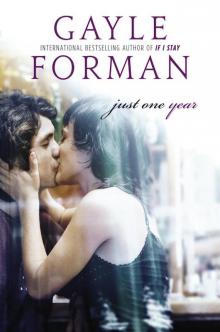 Just One Year
Just One Year If I Stay
If I Stay Where She Went
Where She Went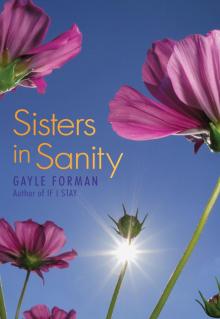 Sisters in Sanity
Sisters in Sanity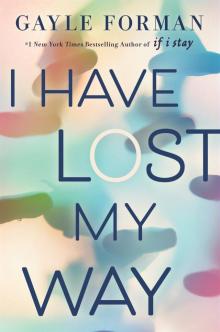 I Have Lost My Way
I Have Lost My Way Just One Day
Just One Day I Was Here
I Was Here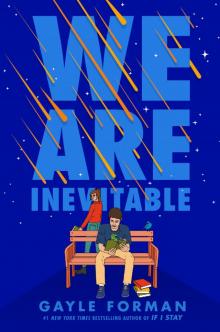 We Are Inevitable
We Are Inevitable Just One Night
Just One Night Just One Day jod-1
Just One Day jod-1 Just One Day 02: Just One Year
Just One Day 02: Just One Year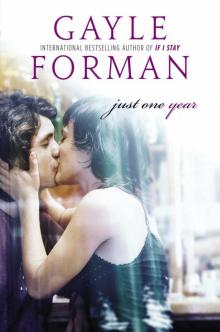 Just One Year jod-2
Just One Year jod-2